
7 minute read
Family Ties
In times of need, Hualālai employees and their loved ones receive the community’s support through a vital foundation.
BY RIMA SUQI
The Hawaiian word ‘ohana means “family,” making it the perfect name for the community-driven foundation that provides financial assistance to employees of Hualālai Resort. The Hualālai ‘Ohana Foundation—the brainchild of a handful of Hualālai homeowners who’d witnessed the financial strains many employees experienced even in the best of times— debuted almost 20 years ago and has since helped more than 8,600 people.
In the beginning, the nonprofit offered scholarships for private K–12 education and financial aid to those with exceptional medical needs, and over the years, it has grown considerably. Today, it includes 14 educational assistance programs, for both children and adults, and three medical aid programs—all funded by donations primarily from Hualālai homeowners, plus a few corporate sponsors and private charitable foundations. In 2019 alone, it granted 211 medical awards totaling $205,700 and 641 educational awards exceeding $716,000.
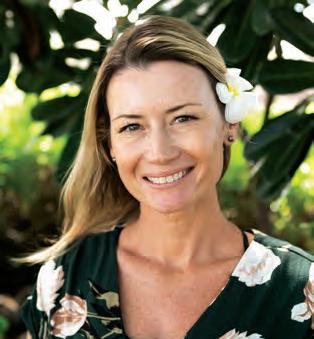
Nico Leilani Verissimo, executive director of the Hualālai ‘Ohana Foundation.
Nico Leilani Verissimo, the foundation’s executive director, is no stranger to this type of generosity. “I’ve been on my own since a very young age,” says the Hawai‘i Island native. As a teen, she spent four years working at Hualālai restaurants—including the Residents’ Beach House, Club Grill, and Pahu‘ia Restaurant (now ‘Ulu Ocean Grill)—where she befriended a couple who were return guests. “They told me that people can take your health, your wealth, and sometimes your happiness, but that they could never take your education from you,” recalls Verissimo, noting that she was the first in her family to go to college. “They told me they saw potential in me and wanted to help me go back to school, and provided me with a full scholarship, independent of any charitable entity or formal application process, as a gift to me.”
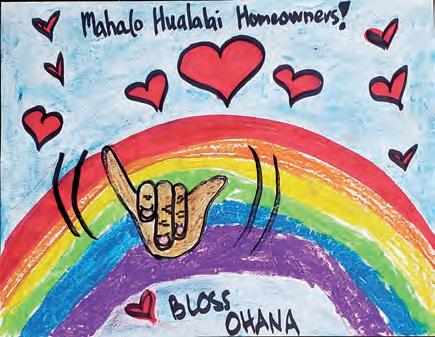
An artful note of gratitude sent to the foundation to thank Hualālai Members and donors for extending their aloha spirit to families.
There was no Hualālai ‘Ohana Foundation at the time, yet Verissimo, who would go on to earn a degree in public relations journalism from the University of Hawai‘i at Mānoa, was the fifth person to benefit from this couple’s generosity. “When I graduated [in 2003], I asked what I could do to repay their incredible gift, and they said, ‘Just pay it forward for others who have the same dreams and aspirations.’ ” She spent the next 16 years working in advancement for the University of Hawai‘i Foundation, and when she heard of an opening at the ‘Ohana Foundation, she says it was a full-circle “chicken skin” (goose bumps) moment; she joined the staff in 2019.
In 2020, the global coronavirus pandemic brought unforeseen and extreme challenges to the Hualālai community, with Hawai‘i’s tourism restrictions resulting in the temporary closure of the Four Seasons Resort Hualālai and the furlough of more than 700 employees. Here, Verissimo explains how the foundation has stepped up to help them and their families weather the storm.
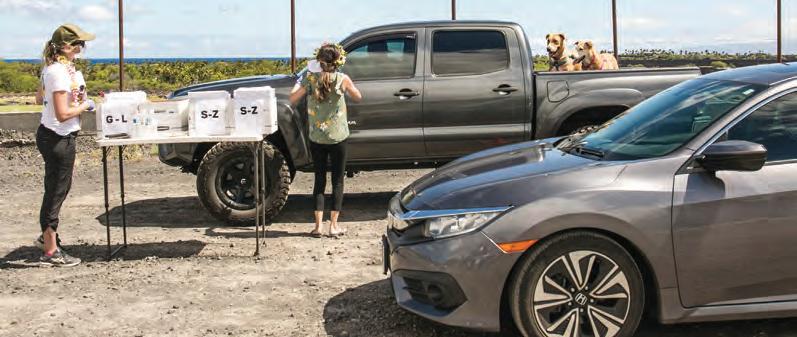
Drive-through distribution of the foundation’s ‘Ohana Kokua (kokua is Hawaiian for “help”) kits on May 1, 2020, during the resort’s coronavirus furloughs.
It’s been an exceptional year for the Hualālai ‘Ohana Foundation. How quickly were you able to mobilize after the resort’s closure? As soon as the resort closed, our phones were ringing off the hook, with homeowners asking how they can help the employees. Fifty percent of families on our island fall within the ALICE [Asset Limited, Income Constrained, Employed] threshold, United Way’s barometer of financial stability necessary for household survival. These are families working maybe two or three jobs, who still struggle to make ends meet because the cost of living in Hawai‘i is extremely high. In March [2020], we launched a crisis-response fund with the goal of creating support for the most immediate, basic life needs.
How were you able to help? First, we sent a survey to all the employees to determine needs and concerns. The unemployment offices in Hawai‘i were inundated, and we learned that their greatest concerns were how to put food on their tables, how to feed their families, and how to pay their utility bills, so that’s what we responded with. We worked with our local businesses—KTA Super Stores, Foodland, Target, Costco, Hawaii Electric Light Company—and got gift cards for the employees. Many of those businesses contributed in-kind on top of what we purchased, so that we could help more people. On May 1, we did a socially distanced drive-through where we distributed 400 ‘Ohana Kokua [kokua is Hawaiian for “help”] kits. Each had $600, a customized combination of gift cards and $100 cash from one of our homeowners who wanted to add that into each kit.
The response must have been amazing. These employees piled their kids and dogs into their cars and drove onto campus after not being here for over a month. As they drove through, we all—our staff and the homeowners—stood out with our homemade signs that said we miss you, we love you, can’t wait to see you soon. The employees were really moved; we saw so many people crying, it was really touching. We didn’t tell them what would be inside the Kokua kits, so it was all a surprise. Soon after that, we had thank-you letters pouring in. We started calling them “tissue-box thank-you letters.” They were really moving and heartfelt.
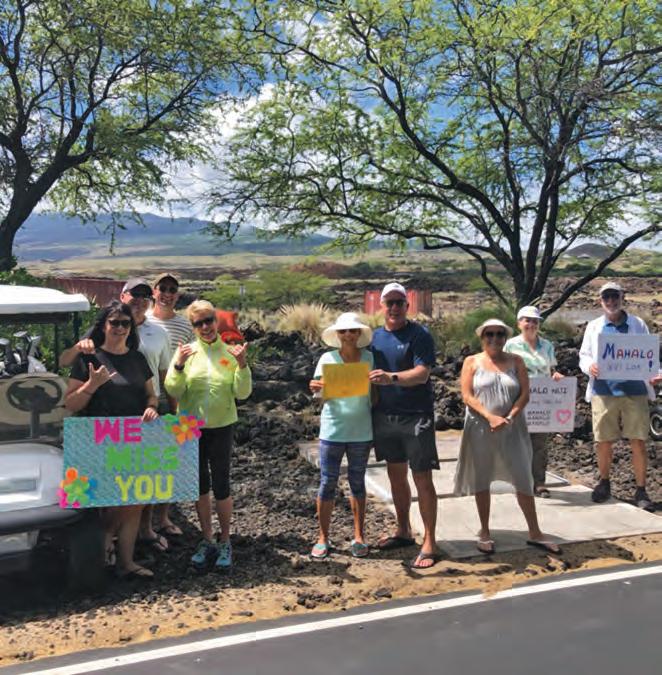
Roadside expressions of love and appreciation for Hualālai’s employees during the pandemic.
So you did it again. On June 17, we had a second distribution, to an additional 235 employees who we didn’t reach the first time. Soon after, these families were beginning to think about school, as the end of summer drew near, with a number of new challenges on the horizion, including what it would mean to transition to remote learning. Many of them had only one computer at home, and not great Internet. Our education committee came up with the idea to create an ‘Ohana@Home Technology for Education award. We sent out applications and awarded 193 additional vouchers for anywhere from $500 to $800 to secure a computer, printer, router, high-speed Internet—whatever they needed to make the transition to remote learning easier.
You’ve been on both sides of the generosity equation. How does it feel to fulfill the promise you made to your benefactors? They say the product of philanthropy is a changed life, and I can speak from experience when I say that I know what it means to have your life changed because someone cared about your well-being. When you help someone’s family, it doesn’t just help here and now, it also helps future generations. This is about giving back and helping others, and it drives me every day of my life. I feel lucky to be able to do this—there’s no greater joy than being able to help others.

The Akau ‘ohana, one of many Hualālai Resort–employee families who have received support from the foundation.
FRIENDS INDEED
The Hualālai ‘Ohana Foundation has helped more than 1,400 individuals in the past year, among them James Ebreo and Jan Warnecke.
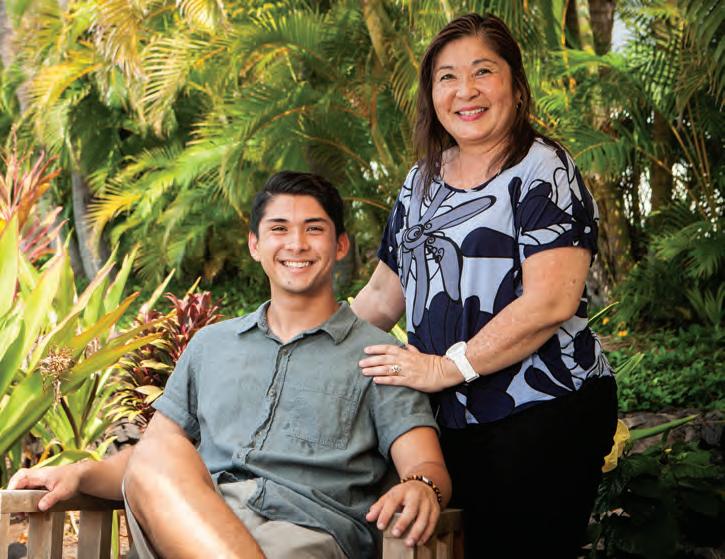
Jan Warnecke and son Taylor
A 16-year employee of Hualālai Resort, Jan Warnecke (above, with son Taylor) is currently an administrative assistant for the spa and sports club. “I will always be grateful and thankful for what they’ve done for me and my family,” she says of the foundation’s support. “No words can explain the importance of them in my life.” Warnecke recently received an ‘Ohana Kokua kit of gift cards and cash, which were distributed during the resort’s furloughs. She and her husband also have put their two sons through private schools and college with the help of foundation scholarships, and they’ve received financial assistance for surgeries, including her husband’s “surprise root canal.”
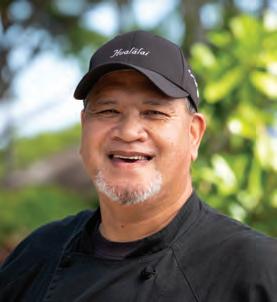
James Ebreo
Like Warnecke, James Ebreo (above) was able to fund his three children’s educations with help from the foundation. But last year, the executive sous-chef, who at age 59 is a 21-year veteran of the resort, needed emergency aid: He suffered a heart attack and had to be transported by medevac to Honolulu for treatment. Months later, he was diagnosed with a blood disease and medevaced again, spending additional time in the hospital for back surgery. “From May until October, ‘Ohana helped me pay some of the medical expenses my insurance didn’t cover, even the medevac,” says Ebreo. “How do you thank people for stuff like that? You can never repay them for what they do for people. I rarely do interviews, but this one I have to. It’s a small way to say thank you and give them all the praise they deserve.” —R.S.






